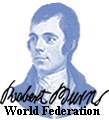


 |
 |
 |
James
Burness
First
cousin of Robert Burns. Born 1750 in Montrose. (Note original spelling
of name Burness, latterly changed by the poet, to Burns.) James became
a solicitor in Montrose, although little is known of him other than
through his connections to Robert Burns. In particular, a total of 9
letters are known to have been written from Robert Burns to his cousin.
These letters also record that James assisted in the promotion of the
First Edinburgh Edition of Burns work and that he made financial contribution
to help in the project. Following Robert’s death, he offered to
assist in the education of the poet’s son Robert Jnr, but Jean
Armour did not wish to split the family.
Born
in 1721 at Clochnahill, (pronounced- Cloch-na-hill – with the “och”
sound as in a Scottish “Loch”) in Kincardineshire. As a consequence
of the Jacobite Rebellion, he and his brother moved initially to Edinburgh
in search of employment, and two years later arrived in Ayrshire. (See
article “Beginners Guide to Robert Burns” in the Archive section) Only
one letter has been found from Robert to his father, written whilst
the poet was living and working in Irvine. Rabbie’s short stay
in the old market town of Irvine, (noted then as “Irvin”)
on the west coast, approximately 12 miles north of Ayr was to be the
poet’s darkest period. Extremely ill, living in terrible conditions
and virtually penniless, Robert Burns suffered deep depression at this
time. Whilst Father & Son were often in conflict, Robert clearly held him in high regard. Undoubtedly, William Burness strict views, and his commitment to “education” played a most significant role in the Roberts achievements. William Burness died 13th February, 1784. To
return to the
letter to click Back Mrs.
Frances Anna Dunlop
Following
a number of family problems, culminating in the death of her husband
(John Dunlop of the village, Dunlop, near Kilmarnock in Ayrshire), Frances
Dunlop was at a low point. A friend presented her with a copy of a Burns
poem, and such an impact it had, she wrote to the poet, ordering 6 copies
of the Kilmarnock Edition. The piece in question? What else but “The
Cotter’s Saturday Night” (The subject of this poem was none
other than Robert’s own father!) A
strong friendship developed through correspondence, clearly demonstrated
in the number of letters written. Perhaps most interesting is the stark
contrast in backgrounds. It is clear however, that unlike many “socialites”
of the time, the relationship was not based merely on her curiosity
of the farmer poet, or his “pop star” image. Frances
Anna Dunlop genuinely respected Burns. The feeling was mutual and he
trusted her views. She assumed the role of providing critical appraisal
on his work and advice on his direction in life, but their strong friendship
was fractured over Rabbie’s outspoken political views. The
problem was Burns’s apparent support for the French Revolution….particularly
distressing for Frances Dunlop as her Sons served in the army,
and she had family ties with the French nobility. Latterly,
she ignored his letters and the relationship faltered. She died in 1815,
at the ripe old age of 85. Agnes
McLehose …or….. “Clarinda”
Following
a whirlwind romance, at the age of 17, “Nancy” Craig married
James McLehose, a Glasgow lawyer. The marriage was turbulent and he
regularly beat her. Pregnant with his 4th child, she left him and returned
to her father. James McLehose retreated to Jamaica, but they never
divorced. Now
living in Edinburgh, Nancy met the now famous poet and it appears it
was “love at first sight” Burns
first letter to Nancy was on 6th December 1787, in which he is responding
to her request to join her for tea ……which he had to postpone
for a few days. Burns
was clearly infatuated by Agnes, and she with him. Robert had aspired
to being matched with a woman of the higher classes. She was taken by
the imagery of the famous, handsome poet of whom everyone was speaking.
Given her married status, a true love affair was impossible. The
two now took on the pen names Clarinda & Sylvander to protect their
identities in correspondence. Burns tried very hard to seduce her by
letter, and many Burns scholars have since argued over the actual extent
of the relationship. One question is still unanswered….Did he or
Didn’t he….!!! Whilst it would appear from the tone of the
letters that it was unlikely “he did”…..no one will ever
know. The
relationship cooled and Agnes distanced herself as Rabbie’s literary
advances grew stronger….clearly too strong for her comfort and
she warned him off. Burns wrote for her “Ae Fond Kiss”, arguably
the greatest love poem ever written, in December 1791. Dr
John Moore (1729 - 1802) Moore was an academic of some note, who studied medicine both in Scotland and in Paris. He was also an author, having written a number of authoritative books on culture, medicine, the French Revolution (which he witnessed) and a novel - "Zeleco" - which Burns particularly admired.
Initially, Burns was hesitant in contacting Dr Moore, feeling out of his depth with such an intellect. When contact was made, Moore tried to persuade the poet to stop writing in the Scottish dialect - a piece of advice which Burns thankfully ignored ! Most importantly however, Burns wrote the following letter to Moore - a short autobiography of the poets life. This document is considered to contain the most revealing information on Robert Burns and gives the reader great insight into his mind, perceptions and life. |
|
© 2000 The World Burns
Club. Under no circumstances can any of the contents of this
site be copied, reproduced, |